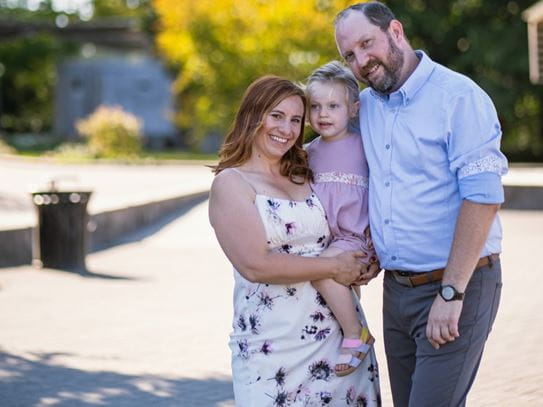After rounds of chemotherapy and a surgery to remove a tumour in her colon, Natalie Lipschultz hoped that her cancer experience had come to an end. Unfortunately, a year and a half later, she found that her cancer had spread to the liver – only 5 months after giving birth to a healthy baby girl.
“From the start of when they found the liver lesions, people were talking to me like I was already dead,” Natalie says. “My daughter wasn't even a year old.”
Natalie started chemotherapy again and had surgery in July 2022 to take out the lesions. Since then, she has had blood work and CT scans every 3 months and has quickly recognized the importance of having a supportive healthcare team.

After her second treatment, Natalie heard from her oncologist that exercise could help her decrease the chances of recurrence. She was referred to a research project that, in her doctor’s opinion, showed promising results. The program helps people manage difficult symptoms and improve quality of life through self-management and exercise, which is suspected to reduce the likelihood of cancer coming back.
Funded by a Canadian Cancer Society (CCS)-Canada Institutes of Health Research (CIHR) Cancer Survivorship Team Grant, the cancer rehabilitation study CaRE-AC is an 8-week structured exercise and self-management rehabilitation program focused on maximizing independence and quality of life for people living with metastatic disease.
Led by Drs Jennifer Jones and David Langelier (University Health Network) and Dr Kristin Campbell (University of British Columbia), the national research team is working to better identify and manage the negative effects of cancer and its treatments, increasing access to cancer rehabilitation through online solutions and making these services more widely available to survivors and those living with advanced and metastatic disease.
“There is a growing body of research supporting exercise to improve symptoms and, for some patients, reduce the risk of recurrence or progression,” Dr Langelier says. “This study represents the first in a planned series of studies looking to explore this in patients with advanced or incurable cancers.”

Helping people manage the negative symptoms of treatment
Over the past 20 years, improved treatments have helped more people with metastatic cancer live longer. But, while these treatments can extend life, they often cause issues like reduced physical independence, fatigue, pain and emotional distress in up to 75% of people with cancer.
“These challenges significantly lower quality of life, even long before the final stages of illness,” Dr Jones says. “Research shows that rehabilitation focusing on physical function can help, but such services are still lacking and need further development to meet the needs of this growing group of survivors.”
Most of the participants in Natalie’s classes were on active treatment and the instructors tailored the workout based on a participant’s individual physical abilities. Now, knowing that exercise can help reduce many of the symptoms caused by treatment, Natalie feels guilty if she doesn’t get those 150 minutes of workout each week.
“I really liked the exercise class,” Natalie says.
“Fitness was already a part of my own journey, and at that point I had been getting bored of other workouts, not taking it as seriously. So, it gave me a bit of a kickstart.”
“Natalie’s journey, like many others going through the cancer rehabilitation program, has been truly inspiring,” Dr Langelier says. “We consistently see participants increasing their independence and re-establishing a sense of control during a very chaotic time in their lives.”
For Dr Langelier, another impactful component of the program is that participants build new relationships with others facing similar circumstances and taking proactive steps to better understand and manage their symptoms.
“These changes are a testament to the program's ability to empower patients, not just physically, but emotionally and socially as well,” Dr Langelier says.
Inspired in part by the CaRE-AC study, Natalie has continued to live an active lifestyle, implementing to this day many of the skills taught to her by the CaRE-AC rehabilitation program. While she continues to undergo regular scans and surveillance, Natalie lives life to the fullest.
“I felt very supported in this program,” she says.
Funding for cancer survivorship research
For Dr Jones and the team, the unprecedented investment from CCS to advance cancer survivorship research is timely and responds to an urgent need to understand and focus on the issues faced by more and more cancer survivors in Canada.
“Thanks to funding from CCS, our research is tackling critical gaps in cancer care,” Dr Jones says. “This support is essential in helping us extend the reach of cancer care and improve the quality of life for all survivors.” Impactful research programs like this one can only happen when many people, including researchers, healthcare providers, donors and people with cancer, work together to take on cancer’s biggest issues.
If you have metastatic breast or gastrointestinal cancer and are interested in participating in the CaRE-AC study, please contact exercise.research@ubc.ca (Vancouver residents) or amrah.ahamed@uhn.ca (Toronto residents).
